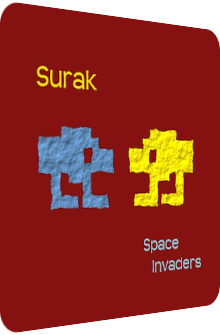
Surak
Space Invaders
2012
Space Invaders is the 13-track self-released debut album by the Italy-based producer Surak aka Danilo Fittipaldi. Whatever its quirky title suggests to the listener, Surak succeeds the expectations by twisting, tossing and turning the respective allusion patterns around. At least I felt that way when the artist approached me via email and mentioned genre terms like Ambient (sure!), Space Rock and electronic constructions. I deemed the album valuable due to Fittipaldi’s descriptions alone, but I was not prepared for the actual music, which is far more serious and reduced than I expected it to be, which is actually a truly great boon. Instead of unleashing gazillions of stardust-powdered synth washes as many other space-related Ambient artists justifiably do, Fittipaldi goes back to the ancient basics of this relatively young genre and offers the listener partially uplifting, partially gloomy piano arrangements which are then ennobled and purposefully perturbed by electronics, bleepy pulses and the occasional spoken word sample with unexpectedly meaningful messages. The other main instrument of this album is the electric guitar. Its warm, soulful and non-screeching use only fleetingly evokes the picture of the Prog Rock salad days before the listener realizes that it is used in a much more Pop-focused way. Catchy but modestly unassuming melody structures are the key to the album’s success rather than improvised riffs and an overly adjuring depiction of our galaxy. A third piece of the formula comprises of cautiously embedded synth layers that are only very seldom thick or well-saturated. They are used as accentuating devices only, except for one piece which will undoubtedly capture the hearts of Drone fans. You can listen to the full album on Surak’s SoundCloud page and via his Bandcamp page.
While the title Space Invaders suggests an airy or lofty overarching theme, its opening title One, a piano arrangement, is decidedly earthen and solemn. With only a few scattered piano tones in minor, this is actually a dreamy, cinematic gateway, further refined by piercing synth strings and bit-crushed machine-like drone vesicles. Seriously: if you told me that this scenery was taken from a 16-bit Final Fantasy game, I would have believed it without the slightest doubt. Surak skillfully ships around overly doleful rocks and creates a melancholic yet enlightened avant-garde vignette. Rescue continues this minimal path with thermal heat-injecting, distantly harpsichord-like guitar layers in a similarly enchanting vintage 90’s atmosphere. Accentuating electric pianos and a mellow snare drum layer underline the ambiguously crisp nostalgia of the iridescent main melody. The second phase comprises of a revved up overdriven electric guitar which adds powerful chords to the mélange without destroying the carefully built setup. While Confessions Of An Ordinary Mind feels like an interlude stretched out to almost four minutes due to its distant pulse-laden static noise carpet, a repeated golden shimmering piano motif and its most important ingredient, the eponymous confession containing monotonous vocal delineations such as "I am not well-trained in smile, but always curious and want to help others," Pentagram fathoms out reciprocating patterns, mediating between a warm six-to-seven-note piano aorta, a scintillating glacier in tandem with its trembling brethren and a, to my mind, all too acidic chime pulse which destroys the mellowness of the piano melody. In this case, the mediation goes wrong, as the frosty sine waves reign over the more soothing ingredients.
What Pentagram lacked in balance, Cube delivers big time, as it changes the tonal and emotional spectrum for the first time by unleashing spectral blurry drone veils reminiscent of a Dark Ambient structure, a pumping bassline together with almost infinitesimally gleaming piano chords in minor and the pressing melodrama of the 50’s era question "Is the sweetheart you married the husband you expected him to be?" The second phase of the tune boosts the eeriness of the synths as well as the presence of the piano in beatless surrounding, whereas the third phase reintroduces the beats. Danilo Fittipaldi has entered the darker Space Ambient realms of Gel-Sol’s K8ema (2010) here, and this alarming piece is indeed eminently haunting, adding depth and weight to the portentous 50’s sample – and believe me, this one remains so stuck in your head! The following Let It Flow resides in much gentler climes, as Surak creates another piano arrangement of the melodious kind. Spiraling gelid chords are in constant dialog with more contemplative and almost uplifting tone sequences. Pink noise crackles and mechanical pulses put the finishing touches on this little dob. A Comet Is Born harks back to the second track Rescue on account of its electrifying guitars whose decay and sustain is delicately aqueous. A bassline, several galactosamine cyber gusts and a clap-and-bleep couple arrive and even start to tower above the three-note guitar motif. It is yet again hard to pinpoint a specific mood, since the echo of the guitars evokes loneliness, but the Rave-resembling synths encapsulate scents of euphoria. In contrast, Cosmic Background Radiation is easier to describe, as Fittipaldi comes up with the most beautiful, upwards floating piano droplets of the whole album. They are downright enchanting, it is almost a pity that they are permeated by a helicopter-esque rotor beat, 16-bit percussion and hibernal synth strings, as I would have loved to find this melody isolated from these otherwise definitely welcome particles.
Moon Landing is another track that penetrates the heretofore prevalent stylistic boundaries of Space Invaders, as it is a proper Drone track loaded with a gorgeous haze of wafting crystals, mellifluous drone clouds and silkened pulses. Heck, everything is smooth and languorous on this track: the sine waves float by dreamier than ever, the occasionally cacophonous synth strings traverse with grace, and the static noise crackles are elevated into wraithlike realms thanks to their streamlined presentation. Moon Landing is undoubtedly the classical Ambient standout track here, and despite its space arc, the listener is submerging into an acroamatic aquascape with no fissures for the sounds to ooze out of. A great counterpart to the bustling coruscant effervescence of the other tracks. A superimposition of tranquility. Whereas Ray Bradbury is the best carved out Psychedelic Rock track with large amounts of glistening guitar layers and a decidedly staggering percussion together with wonderfully cozy dublines, Lullaby is the warmest piano arrangement full of sepia tones, a euphonious gravity (!) and carefully sputtering Glitch loops. Synthetic Sun 2.0 opens with buzzing drones and guitar-glockenspiel chimes whose long sustain meshes with the implicated solar winds in the background. There are gossamer attributes of an Oriental setting attached to each punchy note, and again, this tune could have well been distilled from Final Fantasy VII. Naturally, it is not. It sure is meant as compliment! The final Waltz injects the saddest soul-crushing piano melody in a sensually quavering rain of transmission pulses and bedazzling synth strings. What my cold and technical description cannot possibly evoke is the cinematic scope, the crestfallen loneliness which is strongly augmented by the quick succession of bleeps. What did not work to my ears in Cosmic Background Radiation where I would have loved to feast on the gorgeous piano hooks without the ensuing noises, works all the better on Waltz, as the omnipresent machines elicit a second, possibly deeper meaning than the piano melody could conjure on its own.
Whatever one expects when encountering a title like Space Invaders, Danilo Fittipaldi adds all the ingredients of one’s stereotypical thought bubbles – retro bleeps, video game sounds, cinematic setups and galactic panoramas – to his debut, but purifies the epicurean aura with relinquishment. Instead of magnanimous amounts of synth washes, radiograms and richly texturized layers, Surak presents a form of minimalism that still feels comprehensive and substantial, be it in his five piano-based arrangements, his guitar-driven compositions or his delectable Dronescape. His music inherits the charm of 90’s era video games and meshes it with a strong majesty. The melodies are of a granular nature, either vivaciously sparkling or of a lachrymose melancholy. Whenever he adds a spoken word sample, he makes sure that it provides a tasteful impact about which to ponder is up to the listener. Of particular note is the evocation of loneliness or drifting through space, for Surak’s aural landscapes are not particularly wide. He reaches this effect via bounteous levels of decay, sustain and echo. The many machines that are in close proximity may be perfectly crunchy and dry, but in the end they unveil an additional layer of capaciousness and a cinematic scope. Drone fans will be particularly happy with the moist phantasmagoria of Moon Landing, but I for one am also fond of the Dark Ambient traits as found in Cube as well as the two opening tracks which introduce the listener to the intrinsic soundscape of Space Invaders. Giving an album the minimal label is always a dangerous thing, especially so in Surak’s case whose debut is full of melodies, samples, percussion layers and classical instruments. Each of these devices, however, is carefully adjusted and placed, harking back to the credo "less is more." What Space Invaders lacks in layers, it delivers in melodies, meaning… and drama. A noteworthy launch that eludes all genre traps and clichés with ease.
Further reading:
Danilo Fittipaldi's Twitter account is 00Surak00.
Ambient Review 147: Surak – Space Invaders (2012). Originally published on Nov. 14, 2012 at AmbientExotica.com.
